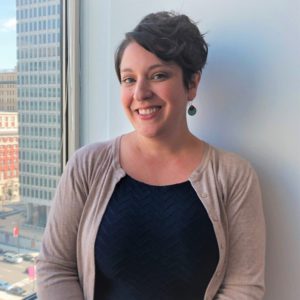This fall, Fairmount’s introducing readers to the newer members of our team, who’ve arguably made the most adaptive shifts to consulting in abnormal times this year. Rae Pagliarulo, Project Manager, has quickly established herself as a “word wizard” among clients for her swift, skillful, and highly strategic messaging in all forms of grant proposals and donor communications. Rae also plays a leadership role on Fairmount’s staff-led Social Justice Committee. She earned herB.A. in Liberal Arts from West Chester University and an M.F.A. in Creative Writing from Rosemont College.
FV: With 2020 shining a light on the need for a strong nonprofit sector, what are a few of the ways you’ve helped clients respond to emergent crises and connect with key stakeholders in recent months?
RP: For me, the real currency of 2020 is honesty and candor. For a nonprofit questioning its ability to meet budget, or make payroll, or even keep the lights on, radical honesty with supporters – be they major philanthropic institutions or the donor down the street who writes a check every month – is paramount. No two organizations are feeling the effects of this pandemic in the same way, and no two foundations are responding in the same way. The big issues we’re facing right now – racial injustice, climate change, a rapidly spreading virus – they’re all exacerbated by a tenuous relationship to the truth. If we can lean into the vulnerability that comes with honesty, we stand a chance at getting what we really need. Our clients understand this, and we’ve worked together on the most appropriate and impactful ways to share candid discoveries about what’s most essential, so supporters and funders feel trusted, informed, and most importantly, clear on how to make an immediate difference.

FV: How does your expertise as a writer and development professional inform your current work on behalf of your clients?
RP: It never truly escapes me that for 10 years, I was in the same position as many of my clients. My decade working in development gave me the experience, insight, and empathy I need to approach each of my current projects thoughtfully. I also love being able to do my favorite things – writing, editing, and manipulating language – for my clients. These activities not only come naturally to me, they light my brain up like a switchboard. Sometimes I see it more like translation – the information, strength, power, and impact of the organization or program already exist. It’s my job to translate it into a different lexicon, to create connective tissue between concepts, or to turn a 500-word summary into a 15-page proposal. I’m grateful to work with organizations and people that are rich with valuable source material – knowledge, and experience, and passion that make my translation work an incredibly easy and rewarding charge.
FV: What does Fairmount’s social impact mission mean to you, especially in this moment?
RP: It means that we share guiding principles that allow us to grow and improve and learn in vitally important ways. Like anything worth doing, there’s no way to get social justice perfectly right, or to get to the point where we have nothing left to learn. It’s a moving target and a lifelong commitment, and we must be ready to change and open as the world changes and opens. This mutable nature means that it’s impossible to give ourselves a grade or decide if we’re deserving of a gold star. I appreciate that in my work at Fairmount, there’s a tacit understanding that growing, learning, and getting better gradually IS in fact, gold-star-worthy work. In many instances, the process is the product. And for me, a chronically Type A person who tends toward a more binary relationship with progress, this distinction allows me to feel personally and professionally safe as I stumble my way towards better with my colleagues.
FV: No day is “typical” anymore. Tell us how you engage with clients, your Fairmount teams, and the nonprofit sector while working virtually.
RP: I am personally big on casual video check ins. There is such a performative element to Zoom, and honestly, a performative element to consulting. I try to be mindful of this dynamic and create moments of frank, unstructured, casual interaction throughout the week, both with my colleagues and, where possible, with my clients. Nothing can replace the experience of grabbing coffee or hanging back in a conference room to debrief on a recently adjourned meeting, but we can be intentional about the time we spend focused on deliverables and deadlines, and the time we spend creating authentic connections with each other. At a time when we need to balance productivity with self-care, a time when isolation and distraction have become daily norms, both are vitally important.
FV: How are you finding ways to unwind and recharge? What gives you energy?
RP: Now that my least favorite time of year, summer, is safely in the rearview mirror, time outside is the most important way to unwind for me. I’m known to sit in parks or walk long distances until we get into the 20s. Even though my neighborhood is one of the less green areas of the city, I’m lucky to live just a short drive away from some of the area’s most beautiful trails, rivers, and lakes. When I need a boost of inspiration, I turn to my volunteer gig as Associate Editor of an online literary magazine. I read, edit, and ultimately publish short creative nonfiction, and in my work helping writers to polish their work and bring ideas to their fullest expression, I get hundreds of opportunities to read amazing work, learn from diverse writers, and gather ideas on how to become a better writer myself.
